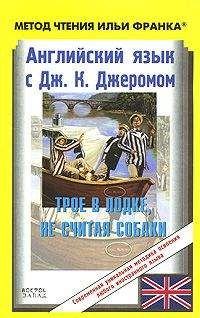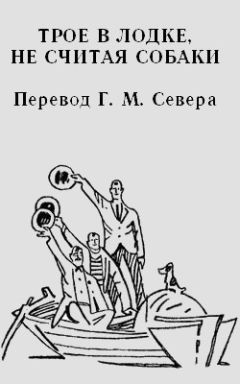Jerome Jerome - Английский язык с Джеромом К. Джеромом. Трое в лодке, не считая собаки
conclusion [kǝnˈklu:ʒ(ǝ)n] exhibition [,eksɪˈbɪʃ(ǝ)n]
The people about the river began to get quite absorbed in him after a while, and to make bets with one another as to what would be the outcome of his next push.
In the course of time my friends arrived on the opposite bank, and they stopped and watched him too. His back was towards them, and they only saw his jacket and cap. From this they immediately jumped to the conclusion that it was I, their beloved companion, who was making an exhibition of himself, and their delight knew no bounds. They commenced to chaff him unmercifully.
I did not grasp their mistake at first, and I thought (я сначала не понял их ошибку и подумал), "How rude of them to go on like that, with a perfect stranger, too (как невежливо с их стороны так вести себя, да еще с совершенно незнакомым человеком)!" But before I could call out and reprove them (но прежде, чем я смог крикнуть и упрекнуть их /в этом/), the explanation of the matter occurred to me, and I withdrew behind a tree (объяснение дела пришло мне в голову = я понял, в чем дело, и спрятался за деревом; to withdraw — отдергивать /руку/; брать назад; удаляться).
Oh, how they enjoyed themselves, ridiculing that young man (о, как они наслаждались, высмеивая этого молодого человека)! For five good minutes they stood there, shouting ribaldry at him (добрых пять минут они стояли там и кричали грубости ему; ribaldry —грубость, непристойность, сквернословие; ribald — неприличный; похабный; грубый, непристойный; оскорбительный), deriding him (насмехались над ним), mocking him (издевались), jeering at him (глумились над ним). They peppered him with stale jokes, they even made a few new ones and threw at him (они осыпали его старыми шутками, и даже придумали несколько новых и /тоже/ бросили в него = крикнули их ему; to pepper — перчить; осыпать, забрасывать /вопросами, репликами и т. д./; stale — черствый; избитый, выдохшийся). They hurled at him all the private family jokes belonging to our set (они осыпали его: «швыряли в него» всеми семейными шутками, употреблявшимися в нашем кругу; private — частный, личный; не подлежащий огласке; to belong — принадлежать, относиться к), and which must have been perfectly unintelligible to him (которые, должно быть, являлись совершенно ему непонятными). And then, unable to stand their brutal jibes any longer (затем, не в силах больше выносить их грубые насмешки), he turned round on them, and they saw his face (он повернулся к ним, и они увидели его лицо)!
ribaldry [ˈrɪb(ǝ)ldrɪ] unintelligible [,ʌnɪnˈtelɪʤǝbl]
I did not grasp their mistake at first, and I thought, "How rude of them to go on like that, with a perfect stranger, too!" But before I could call out and reprove them, the explanation of the matter occurred to me, and I withdrew behind a tree.
Oh, how they enjoyed themselves, ridiculing that young man! For five good minutes they stood there, shouting ribaldry at him, deriding him, mocking him, jeering at him. They peppered him with stale jokes, they even made a few new ones and threw at him. They hurled at him all the private family jokes belonging to our set, and which must have been perfectly unintelligible to him. And then, unable to stand their brutal jibes any longer, he turned round on them, and they saw his face!
I was glad to notice that they had sufficient decency left in them to look very foolish (я был рад отметить, что у них достаточно вежливости /оставшейся в них/, чтобы почувствовать себя в очень глупом положении; decency — благопристойность, приличие; порядочность; to look foolish — выглядеть нелепо, глупо; оказаться в глупом положении). They explained to him that they had thought he was some one they knew (они объяснили юноше, что думали, будто он был одним из тех, кого они знают = что приняли его за знакомого). They said they hoped he would not deem them capable of so insulting any one except a personal friend of their own (сказали, что надеются, он не считает их способными так оскорблять кого-либо, кроме близкого друга).
Of course their having mistaken him for a friend excused it (конечно, то, что они приняли его за приятеля, служит оправданием этому; to mistake for — принять за кого-либо, обознаться). I remember Harris telling me once of a bathing experience he had at Boulogne (помню, как Гаррис рассказывал мне когда-то об одном случае, который произошел с ним во время купания в Булони). He was swimming about there near the beach (он плавал там недалеко от берега), when he felt himself suddenly seized by the neck from behind (когда почувствовал внезапно, что кто-то схватил его за шею сзади), and forcibly plunged under water (и насильно потянул под воду; to plunge — нырять, окунать/ся/, погружать/ся/). He struggled violently, but whoever had got hold of him seemed to be a perfect Hercules in strength (он отбивался яростно, но кто бы ни схватил его, по силе он казался настоящим Геркулесом), and all his efforts to escape were unavailing (и все его /Гарриса/ попытки вырваться были тщетными). He had given up kicking, and was trying to turn his thoughts upon solemn things, when his captor released him (он перестал брыкаться и попытался сосредоточить мысли на торжественных вещах, когда его противник отпустил его; to give up; captor — захвативший в плен; похититель).
decency [ˈdi:s(ǝ)nsɪ] Boulogne [buˈlɔɪn] Hercules [ˈhǝ:kjuli:z] solemn [ˈsɔlǝm]
I was glad to notice that they had sufficient decency left in them to look very foolish. They explained to him that they had thought he was some one they knew. They said they hoped he would not deem them capable of so insulting any one except a personal friend of their own.
Of course their having mistaken him for a friend excused it. I remember Harris telling me once of a bathing experience he had at Boulogne. He was swimming about there near the beach, when he felt himself suddenly seized by the neck from behind, and forcibly plunged under water. He struggled violently, but whoever had got hold of him seemed to be a perfect Hercules in strength, and all his efforts to escape were unavailing. He had given up kicking, and was trying to turn his thoughts upon solemn things, when his captor released him.
He regained his feet, and looked round for his would-be murderer (Гаррис снова встал на ноги и огляделся, /ища/ своего предполагаемого убийцу; to regain — обретать снова, восстанавливать). The assassin was standing close by him, laughing heartily (убийца стоял рядом с ним и очень/от всего сердца хохотал; assassin — убийца, террорист, наемный убийца /политического или общественного деятеля/), but the moment he caught sight of Harris's face, as it emerged from the water (но когда он увидел лицо Гарриса, появившееся из воды), he started back and seemed quite concerned (он отпрянул и выглядел весьма обеспокоенным).
"I really beg your pardon (прошу прощения)," he stammered confusedly (запинаясь, смущенно произнес он), "but I took you for a friend of mine (я принял вас за своего друга; to take for)!"
Harris thought it was lucky for him the man had not mistaken him for a relation (Гаррис подумал, ему повезло, что тот человек не принял его за родственника), or he would probably have been drowned outright (тогда, вероятно, его бы в полной мере утопили; outright — совершенно, полностью; прямо, тотчас).
assassin [ǝˈsæsɪn] pardon [pɑ:dn]
He regained his feet, and looked round for his would-be murderer. The assassin was standing close by him, laughing heartily, but the moment he caught sight of Harris's face, as it emerged from the water, he started back and seemed quite concerned.
"I really beg your pardon," he stammered confusedly, "but I took you for a friend of mine!"
Harris thought it was lucky for him the man had not mistaken him for a relation, or he would probably have been drowned outright.
Sailing is a thing that wants knowledge and practice too (плавание под парусом — это вещь, которая требует и знаний, и практики) — though, as a boy, I did not think so (хотя, будучи мальчиком/в детстве я так не думал). I had an idea it came natural to a body, like rounders and touch (у меня было представление = я полагал, что оно дается легко, как лапта или салки; to come natural to one — получаться у кого-либо естественно; легко даваться; rounders — раундерз /английская лапта/; touch — прикосновение, осязание; салки /детская игра/). I knew another boy who held this view likewise (я знал одного мальчика, который придерживался того же мнения; likewise — подобно, таким же образом), and so, one windy day, we thought we would try the sport (поэтому в один ветреный день мы решили попробовать это дело: «плавание под парусом»; sport — спорт; отдых, забава, развлечение). We were stopping down at Yarmouth, and we decided we would go for a trip up the Yare (мы остановились /в то время/ в Ярмуте и решили прокатиться по /реке/ Яр). We hired a sailing boat at the yard by the bridge, and started off (наняли парусную шлюпку на /лодочной/ станции у моста и отправились в путь; yard — ярд; внутренний двор; станция, верфь, склад, портовая мастерская). "It's rather a rough day (сегодня довольно суровый/ненастный денек)," said the man to us, as we put off (сказал нам лодочник, когда мы отчаливали): "better take in a reef and luff sharp when you get round the bend (лучше возьмите рифы и идите резко в бейдевинд, когда зайдете за поворот; to take in a reef — брать рифы /уменьшать площадь паруса при сильном ветре/; to luff — идти в бейдевинд, приводить к ветру, стать по ветру)."
We said we would make a point of it, and left him with a cheery "Good-morning (мы сказали, что обязательно так сделаем, и оставили его с = сказали на прощание «Доброе утро/будьте здоровы!»; to make a point of — обратить особое внимание на что-либо; придавать чему-либо большое значение)," wondering to ourselves how you "luffed (спрашивая себя, как это «идти в бейдевинд»)," and where we were to get a "reef" from (и откуда нам взять «рифы»), and what we were to do with it when we had got it (и что нам делать с ними, когда их достанем).
Sailing is a thing that wants knowledge and practice too — though, as a boy, I did not think so. I had an idea it came natural to a body, like rounders and touch. I knew another boy who held this view likewise, and so, one windy day, we thought we would try the sport. We were stopping down at Yarmouth, and we decided we would go for a trip up the Yare. We hired a sailing boat at the yard by the bridge, and started off. "It's rather a rough day," said the man to us, as we put off: "better take in a reef and luff sharp when you get round the bend."
We said we would make a point of it, and left him with a cheery "Good-morning," wondering to ourselves how you "luffed," and where we were to get a "reef" from, and what we were to do with it when we had got it.
We rowed until we were out of sight of the town (мы гребли, пока город не скрылся из виду), and then, with a wide stretch of water in front of us (затем, когда широкая полоса воды была перед нами), and the wind blowing a perfect hurricane across it (а ветер дул совершенным ураганом над ней), we felt that the time had come to commence operations (мы решили, что пришло время приступать к действиям).



